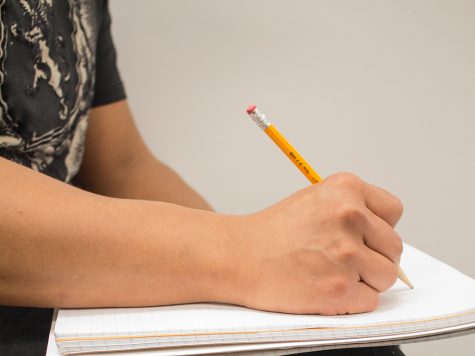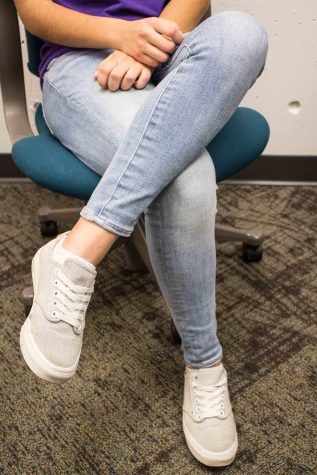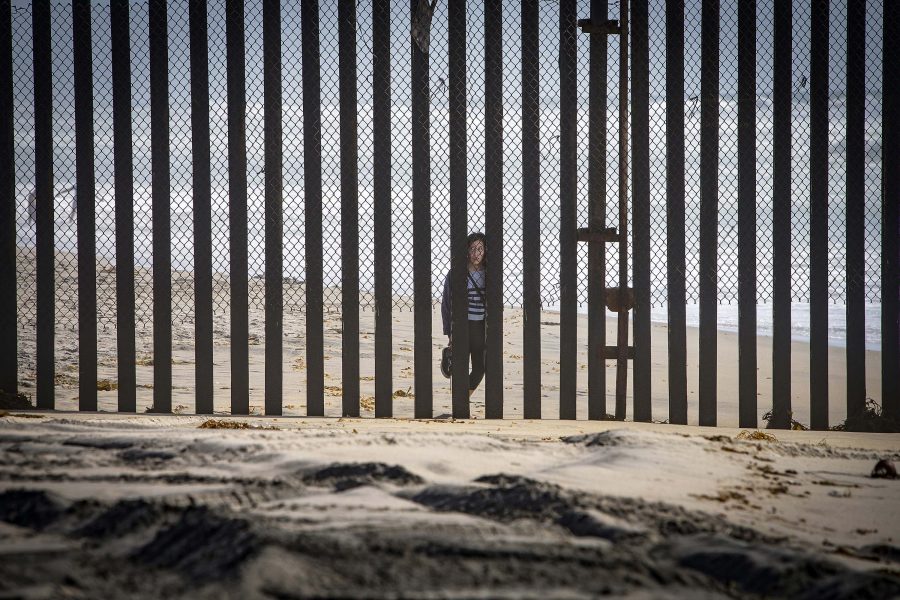Undocumented and afraid
Apr 10, 2017
Across the United States, there are people who live in fear of being forced from their houses, separated from their families and sent to a country they have never known as home.
They are among the 11.4 million undocumented immigrants living in the US, as estimated by the Department of Homeland Security. They come from across the globe and, primarily, from the western hemisphere. Each of them come to the United States with their own story.
Two undocumented students at UNI, Alejandro and Marie, chose to share their experiences with the Northern Iowan (NI). Their stories are featured below.
Ashley Sanchez, junior psychology and Spanish major, is president for Panthers for DREAM Iowa. Panthers for DREAM Iowa is the UNI chapter of the state-wide organization DREAM Iowa, which advocates for undocumented immigrants in Iowa.
“The US is where you come to live the American Dream,” Sanchez said. “But a lot of Latino immigrants and immigrants from around the world- — they don’t realize that the American Dream will only work for you if you are acknowledged as a human being.”
Sanchez said a lot of immigrants want to be documented and want to have legal status. The process is expensive, according to Sanchez, and the amount of money an immigrant has drastically impacts whether or not an immigrant is granted a visa, residency or citizenship. Money can also play a role in speeding up the lengthy process to get citizenship, according to Sanchez.
“A lot of people say, ‘Well, why don’t they just get their papers and get it over with,’” Sanchez said. “My parents were undocumented for 19 to 20 years. My dad had to hire multiple lawyers to help him out in his case just to prove that he should stay here. My mom had to go to women’s prison for six months.”
Sanchez said her mother was detained for working without proper documentation.
Sanchez said undocumented immigrants work the underpaying jobs that citizens don’t want to work. These jobs often pay minimum wage, which means working multiple jobs to provide for the family, Sanchez said.
In 2012, former President Barack Obama issued an executive order that would loosen the deportation of children from the United States under qualifications previously set forward by the DREAM Act.
The DREAM Act was a bipartisan bill introduced in 2001 that, had it passed, would have provided temporary or permanent residence to minors brought to the United States by undocumented immigrants, provided that they arrived in the United States before age 16 and met several other criteria, according to a CNN article from 2012.
The DREAM Act has been proposed in Congress several times, but has never been passed into law.
The DREAM Act contained a provision called Deferred Action for Childhood Arrivals (DACA), which was the primary fixture of Obama’s 2012 executive order.
DACA allows children who arrive in the United States under the age of 16 to be eligible for a work permit and receive a renewable two-year deferral from deportation.
Immigration reform advocates say DACA falls short of providing a clear path to citizenship for people living in the US without documentation.
Other critics say the order effectively provides amnesty to people who are breaking the law.
According to Sanchez, the inauguration of President Donald Trump has posed a heightened threat to undocumented immigrants in the United States.
“The Obama administration only focused on criminals,” Sanchez said. “Trump’s administration is criminalizing everyone from children to teens to parents to grandparents; anyone who has no criminal record but is here [without documentation], they’re a priority.”
Trump has continued to advocate for stricter border control and the construction of a border wall along the southern border of the United States, claiming that immigrants pose a national security threat to the United States.
In a speech to Congress Feb. 28, Trump said the “chaos” at the US border is “uncontrolled” and “reckless.”
“To any in Congress who do not believe we should enforce our laws, I would ask you this question: What would you say to the American family that loses their jobs, their income, or a loved one, because America refused to uphold its laws and defend its borders?
“Our obligation is to serve, protect and defend the citizens of the United States,” Trump said.
Alejandro’s story

“Alejandro” an undocumented UNI student, writes while in an interview with the NI.
“Immigrants have this thing where, after living so long in a different country that is not yours, you don’t feel like you belong to the country that you live in,” Alejandro said. “But you also don’t feel like you belong in your home country because you don’t know how it is anymore.”
Alejandro is an undocumented immigrant studying at UNI who asked to be called Alejandro to protect his identity.
Alejandro first came to the United States at age 19 with his father to send money to his mother in Mexico who was ill at the time. He described his first journey to cross into the US.
“I walked six hours and then waited three hours in a bush by a farm,” Alejandro said. “I waited three days in the house for someone to drive us North.”
Alejandro’s father had family living in Michigan and he had a job lined up. Alejandro started working two jobs within three days of arriving in Michigan.
“You get here, you start working,” Alejandro said. “You have to pay for the trip, we’re talking about $3,000. If something happens and you have to leave, you still have to pay the people, and paying here is easier than in Mexico with a [small] salary.”
For Alejandro, it didn’t necessarily get easier once he made it to the US.
Alejandro was driving in a parking lot where he bumped into another car. Police who were already in the parking lot investigating something else noticed Alejandro hit the other car.
“They asked me for my license, which I don’t have,” Alejandro said. “Then they started to ask even deeper questions which I refused to answer because a police officer shouldn’t ask you about your legal status.”
The police complied with Alejandro’s refusal to answer any questions, but called Immigration and Customs Enforcement (ICE). ICE told the police that Alejandro did not have any documentation to be in the United States.
Alejandro was deported at the age of 21, having been in the United States for two years.
Alejandro spent five months in Mexico after being deported. Alejandro made five attempts to reenter the United States, being detained twice in the process.
He was eventually able to cross the border into California at Sonora.
“It took me 7 days walking through the desert to get to the United States,” Alejandro said. “The group was pretty big, maybe 30 people, so they picked us up in three different vehicles at three different times.”
Alejandro then traveled to a house, where he was able to shower and eat. These houses run as businesses, assisting immigrants attempting to cross the border into the United States. Using a service like this can cost an immigrant nearly $3,000.
After arriving at the house, Alejandro paid half of his debt to those assisting him.
“Depending on where people are going, they put a group of people in a vehicle and start driving north,” Alejandro said. “As they’re driving they’re dropping off people depending on where your destiny is.”
Alejandro travelled back to Michigan where he worked three jobs within two months of returning to the state. Alejandro met his wife while working as a server in Michigan.
“She graduated and moved to the Caribbean for medical school,” Alejandro said. “I would pay airplane tickets so that she could come and visit on her breaks.”
Alejandro also sent money to his wife while she was in medical school to help pay for groceries and other living expenses.
Alejandro came to UNI because his wife got a job in Iowa after finishing her rotations and graduating from medical school.
“She was done with school, and she was finally making money. So she said, ‘Okay now it’s your turn,’” Alejandro said. “All these years I was always talking about — I always had the desire to go back to school and finish what I was never able to finish.”
Today, Alejandro lives in fear of many situations that US citizens do not.
“Driving every day is where the fear consistently attacks my mind,” Alejandro said. “Even today, driving on my way to school, having a police officer behind me for two miles. And somehow he gets next to me — and usually that means they’re looking to see who is in the car after running the plates.
“I’m just waiting for the lights to turn on and something to happen.”
Alejandro said he will likely be moving back to Mexico this summer. He has expressed concern that reentering the country will be extremely difficult if he does leave and attempt to come back.
Alejandro plans to continue his education in Mexico if possible.
Marie’s story
“My mother and I came here like most immigrants do — very legally, with visas and everything, because my mother was originally going to marry someone in the United States,” Marie said.

“Maria,” an undocumented UNI student, sits while being interviewed by the NI.
Marie is an undocumented immigrant from South America studying at UNI. She asked to be called Marie to protect her identity. Marie and her mother’s visas expired years ago; this is the most common reason why immigrants are undocumented in the United States.
Marie’s mother was in love with the man with whom they were going to live in the US.
“When we got here, he kind of just…changed,” Marie said. The man they lived with often argued with Marie’s mother and kept Marie and her mother from leaving too often.
“That was my first translating experience, because I learned a lot of English… [My mom] was trying to tell him to shut up, and I said, ‘I got this!’ and I said ‘Shut up!’” Marie recalled.
Marie estimates she was four at the time.
Marie moved from house to house staying with different friends, both American and Latino, until she and her mother moved in with her aunt who lived in Waterloo. Marie and her mother did not move back to South America, instead staying in the United States to avoid the violence of her home country.
“[My mother] grew up in a time period where she never knew if her brother would be coming home alive,” Marie said. “She didn’t want to go back to that.
“Everywhere you go around the world, you hear, ‘If you go to the States you’ll have better opportunities, you’ll have a better life, stuff is better there,’” Marie said. “Whether or not that’s true is debatable, but that’s what you hear.”
Marie’s aunt moved to Georgia, but Marie had settled in the Cedar Valley and in her school district, so she and her mother stayed.
Marie’s mother got a job cleaning houses because she could not speak English fluently. Marie and her mother lived in 22 different houses during Marie’s childhood and adolescence. Marie’s hardships continued, however, as her mother tried to make a living.
“At one point, we lived under a table at an acquaintance’s house, and then behind a couch,” Marie said. “Then we progressed to a small room […] Then there was this guy who offered to rent a duplex for us. He didn’t expect anything for it, he was just trying to help people.”
Marie spent most of her time during the summer in the Waterloo public library because there was nowhere else to go. Marie moved to Cedar Falls with her mother a few years ago after years of commuting two hours from Waterloo for her mother to get to work.
In May of last year, Marie was accepted into the DACA program, allowing her to get a driver’s license and authentication to work in the United States. However, Marie cannot simply move where she would like in order to pursue a future for herself, making her future difficult to plan.
“As an undocumented immigrant, you’re never allowed to think of the future,” Marie said. “You can’t make plans for the future. I don’t know where I will be, in case something happens.”
Marie’s mother is reliant on Marie for numerous things. Marie provides translation and transportation for her mother.
“I can’t [move away], because it’s — it’s essentially like abandoning my mother,” Marie said.
“I find myself tensing up [around police] and watching my back, ‘Is he going to stop? Is this going to be a problem?’” Marie said.
The threat of law enforcement is ever-looming in Marie’s life, especially because her mother has no documentation. Marie’s mother is the only family she has in the United States.
“The idea of [my mother] having to go back is very difficult for me,” Marie said. “I don’t have anybody else.”
Being an undocumented immigrant has also prevented Marie from traveling to see any family that remains in South America, including her grandmother.
“When my grandmother was dying, we were kind of just forced to wait for her to die,” Marie said. “It really took a hard toll on my mom.”
Today, Marie often struggles with her identity in the United States, and it leaves her wondering what the future holds for her.
“For me, it’s like I’m too [South American] to stay here, but I’m too ‘gringa’ — I’m too American — to go back,” Marie said.
Marie plans to finish her education at UNI, and stay in the Cedar Valley to remain with her mother.









